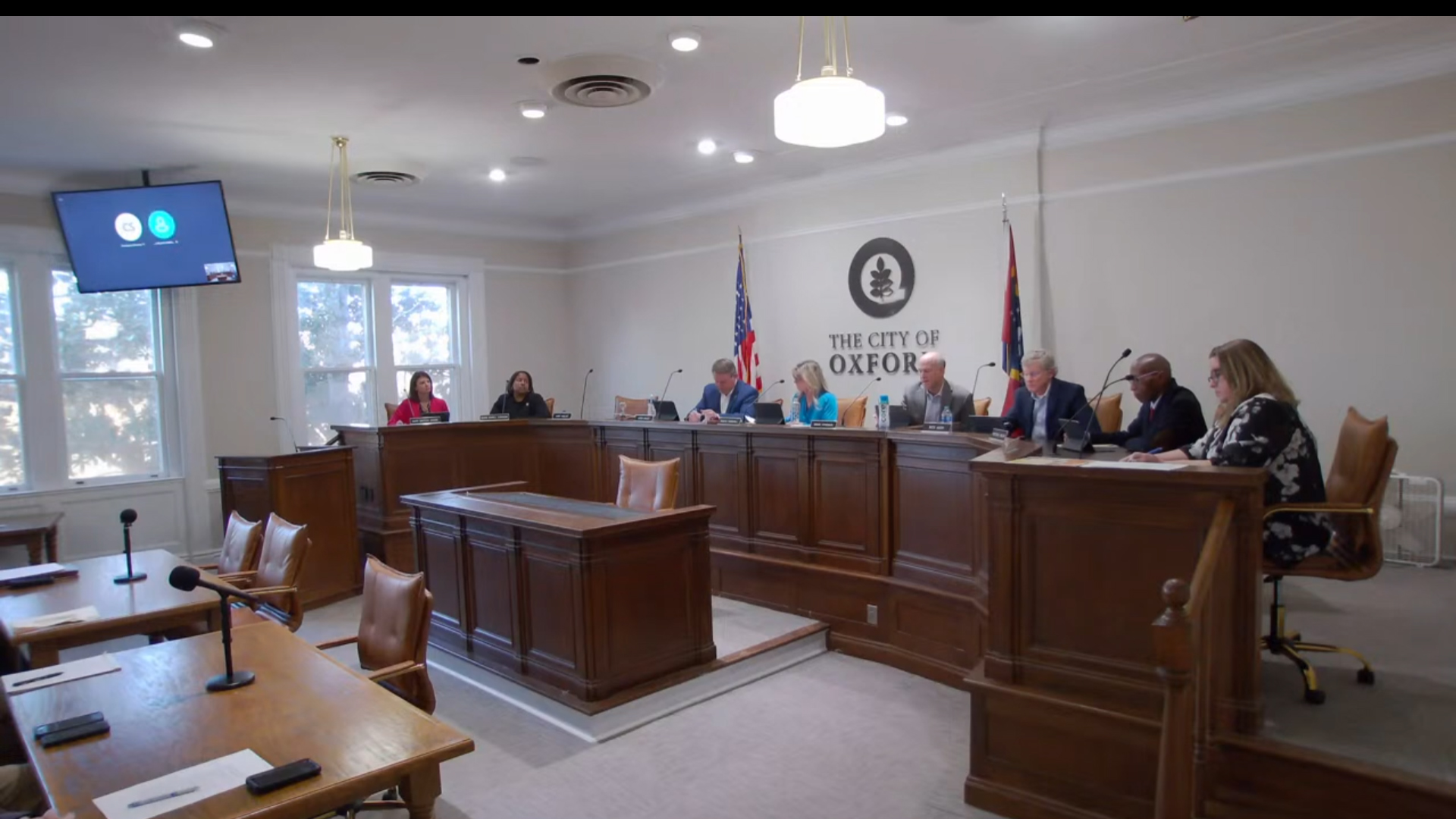Mississippi
State of Mississippi Rejects Resolution Passed by the City of Oxford to Allow Sale of Antebellum Home Cedar Oaks

The City of Oxford Board of Aldermen voted on Tuesday, February 20, 2024 in favor of passing a resolution to allow a sale of the city-owned antebellum home.
Voting in favor of the resolution were Aldermen Brian Hyneman of Ward III, Kesha Howell Atkinson of Ward IV, and Preston Taylor of Ward V. Voting against the resolution were Aldermen Rick Addy of Ward I (where Cedar Oaks is located), Jason Bailey of Ward VI, and new Alderman-at-Large Mary Martha Crowe.
Because Ward II Alderman Mark Huelse was absent from the meeting, there was a tie, which triggered Mayor Robyn Tannehill to cast a vote. Mayor Tannehill voted in favor of the resolution to allow a sale. The audience at the Board of Alderman meeting erupted in a chorus of “boos” and walked out.
On Wednesday, February 21, Mayor Tannehill posted an update to social media which read, “At 8:00 this morning the City Clerk received an email from Shane Barnett, Chairman of the House Local and Private Committee announcing that the committee would only be considering resolutions for local and private legislation that had passed from the local entities with a unanimous vote. Mr. Barnette also noted that the new deadline for submission of such legislation would now be March 22, 2024.
The City’s vote on local and private legislation last night related to the public trust language that preceded the warranty deed from Cedar Oaks, was not passed by a unanimous vote. Therefore, Oxford will not pursue the change in Local and Private Legislation considered at last night’s Board of Alderman meeting.
I look forward to community discussions regarding how Cedar Oaks can be more sustainable, in the best interests of all the citizens of Oxford.”




Mississippi
Mom of 3 Dies After Being Hit by Car Near Mississippi Restaurant: ‘Truly Heartbroken’
:max_bytes(150000):strip_icc():focal(742x271:744x273)/mom-car-crash-072624-tout-8af25918eebf4d7b9c510c4384451d1a.jpg)
A mother of three children was struck and killed by a car near a restaurant in Mississippi on Saturday, July 20, authorities said.
The incident occurred on MS-43 near the Sunset Grill restaurant in Rankin County and is under investigation, the Mississippi Highway Patrol (MHP) said in a news release shared with PEOPLE on Friday, July 26.
The pedestrian, Marcie Errington, 41, of Crystal Spring, Miss., was hit by a Chevrolet Silverado traveling northbound. She died at the scene from her injuries, the MHP added.
The driver of the Silverado, identified by authorities as Donnie Taylor, 67, of Brandon, Miss., was unhurt in the collision.
No additional details were offered from the MHP.
Never miss a story — sign up for PEOPLE’s free daily newsletter to stay up-to-date on the best of what PEOPLE has to offer, from celebrity news to compelling human interest stories.
According to a GoFundMe set up on behalf of her family, Errington was a nurse and a devoted mother to her three sons.
“We are truly heartbroken at the loss of our sweet Marcie,” read the fundraiser description. “She was such a radiant gypsy soul who loved nature, animals and children… Her sons were the center of her universe, and her every action was a testament to the profound love she had for them.”
The GoFundMe described Errington as “thoughtful, selfless, compassionate, and genuinely caring – everything that made her such an amazing momma and nurse.”
“Marcie’s impact on our lives is immeasurable,” the description continued. “She taught us the true meaning of love, empathy, and perseverance. Her legacy of kindness will live on through the countless lives she touched, both human and animal. We are devastated by her loss, but we celebrate the beautiful person she was and the extraordinary life she lived.”
Kelly Johnson, a friend of Errington’s, remembered her as outgoing. “When you think of a Gypsy Soul, that’s what you think of as Marcy, she loved anything that breathed,” Johnson said, NBC affiliate WLBT reported.
Errington was employed at Pedicare Nursing Agency. The news of her death sent a shock to Errington’s colleagues, said Melissa Flanagin, the agency’s founder.
“There was a time of denial where we didn’t want to believe that that had really happened to our Marcy,” Flanigan told CBS affiliate WJTV. “When we learned, and it was confirmed that it was her, we were just heartbroken.”
Johnson told WLBT that the GoFundMe will help Errington’s children.
“There’s a lot of bills and things that have, you know, accrued and you know, just life,” Johnson said. “It’s mainly to take care of those children to make sure they have what they need.”
Mississippi
Mississippi State’s Rendon promoted to brigadier general surrounded by family, friends and servicemen

Contact: Mary Pollitz
STARKVILLE, Miss.—On Thursday afternoon [July 25], Mississippi State alumnus Andrew Rendon, the university’s executive director for Veterans and Military Affairs, was promoted from colonel to brigadier general in the Mississippi National Guard. Less than one-half of 1% of officers in the Army achieve the rank of a general officer.
The first action Gen. Rendon took after his promotion was to present his daughter Sarah and wife Hilary with flowers while thanking the three institutions he credited with his success—MSU, the Mississippi National Guard and his family.
“Not once have those institutions left me alone. Not once have they let me down. Not once have those institutions not cared for me,” he said. “In every instance, as I asked for help support or assistance, they have been there for me.”
MSU President Mark E. Keenum commended Rendon with his leadership supporting the armed forces, military students and his country. Rendon’s service and commitment to others—along with Bulldogs, cowbells and Edam cheese—is what the university is known for, Keenum added.
“We’re also known for our values. Our core values that define who we are at MSU: integrity, strong work ethic and respect for others,” Keenum said. “Gen. Rendon embodies all of these values, and he lives them every single day. So, it’s an honor to recognize him and his achievements this afternoon as he begins this new chapter of service to our state and our nation.”
The promotion ceremony for the Guard’s commander of the 66th Troop Command took place in Wingo Auditorium of the university’s Old Main Academic Center. The event was officiated by MSU alumnus Maj. Gen. Janson D. Boyles, Adjutant General of Mississippi.
Rendon began his military career nearly 30 years ago as an Army Aviator. After spending nine years on active duty, with assignments in Germany and Alabama, Rendon joined the MSNG in 2004 serving in various aviation roles throughout the state, from logistics officer and platoon leader to his current role as troop commander and MSNG director of Joint Staff.
Rendon holds both a Ph.D. and Master of Public Policy and Administration degree from MSU. He also has a Bachelor of Arts degree from the University of Mississippi and a Master of Strategic Studies degree from the U.S. Army War College.
His military awards and decorations include the Bronze Star Medal, six Meritorious Service Medals, the Senior Army Aviator Badge, U.S. Army Parachutist Badge, and numerous other federal and state awards.
Mississippi State University is taking care of what matters. Learn more at www.msstate.edu.

Mississippi
Where can you go from Jackson by train? Curious Mississippi answers

Editor’s note: This is the latest edition of Curious Mississippi, a service to the readers of the Clarion Ledger. Other questions answered by Curious Mississippi included road safety, potholes, cicadas and the international nature of the Jackson airport. Last week, we answered the question of why Mississippi roads are brown. Readers can submit questions by email to CuriousMississippi@ClarionLedger.com and editors will pick out the best and reporters will answer them in an upcoming edition.
Looking to take a trip from Jackson? The city’s Amtrak station located in Union Station allows travelers to take a train to a handful of different destinations via a direct route.
However, there are downsides when opting for a train ride.
Getting North and South by train from Jackson is relatively easy. Going East or West, and you are out of luck.
Three major cities with direct routes by train from Jackson include New Orleans, Memphis and Chicago. A trip to New Orleans in your own car takes just under three hours compared to the four-and-a-half-hour train ride from Union Station. A car drive to Memphis takes about one and a half hours less than a train ride. A plane ride to Chicago is significantly shorter and comparative in price.
So, why opt for a train over a plane or automobile?
Some find trains a romanticized mode of transportation, offering a unique experience not found when sitting on a plane or car or bus. Trains often offer passengers with more room and leisurely views of the surrounding scenery. Train stations and trains themselves are also often easier to navigate for those with disabilities.
Jackson resident Khalilah Wright and her daughter Chandler Wright waited in Union Station Tuesday afternoon for the evening train heading to Chicago, where they had moved from four years ago. Khalilah said they opted for a train ride because Chandler doesn’t like planes.
Khalilah said she and her family travel to Chicago often. She takes a plane when traveling with her husband and train when traveling with her daughter. While both have advantages and disadvantages, Khalilah said riding the train provides more bonding time with Chandler because they can chat while waiting in the station and during the longer ride.
The train is “nice and relaxing,” Khalilah said, and she enjoys the views from the train cars with large windows. She also said a train is a much better option for her mother, who is disabled, to travel to Jackson from Chicago.
Like plane tickets, Amtrak ticket prices vary depending on upgrades and when you book the ticket. Read on to find out which cities you can reach directly from the Jackson Amtrak station. These “direct routes” refer to the cities to which you can buy a one-way or round-trip ticket. There are often several stations in between Jackson and these final destinations, so they are not considered “non-stop” routes.
How to get to Chicago by train
A trip to Chicago from Jackson by an Amtrak train takes about 15 to 16 hours. Overnight rides are offered so you can board the train at 6 p.m. and arrive in the Windy City by 10 a.m. the next morning.
A one-way ticket to Chicago from Jackson for one adult will set you back about $150 to $200 for a coach ticket or anywhere from $300 to $900 for a private room with a restroom and shower.
Five times the fun? A second set of quintuplets is born in Mississippi in less than two years. What are the odds?
How to get to New Orleans by train
A train ride to New Orleans from the Jackson Amtrak station takes around four and half hours. A round trip is feasible for a quick weekend get away.
A ticket for a single adult one-way is about $50 to $60 for a coach ticket or about $100-$150 for a private room with a restroom or sink.
How to get to Memphis by train
Memphis is also a good option for a weekend trip. A train ride from the Amtrak Jackson station to the Memphis station clocks in at just over four and a half hours.
Tickets cost anywhere from about $30 to $50 for a single adult coach ticket or from $100 to $300 for a private room.
Recent answers by Curious Mississippi: Curious Mississippi: Why is car registration so expensive in MS and even more so in Jackson?
Where else can I go by train from Jackson?
There are several other stops on the direct route from Jackson. The stations on this route are not the only Mississippi stations. There is a line that runs from New Orleans connecting stations in Picayune, Hattiesburg, Laurel and Meridian before continuing through Alabama.
Here are all the cities with Amtrak stations on the direct route to and from Jackson, starting with New Orleans and heading north ending with Chicago:
- New Orleans
- Hammond, Louisiana
- McComb, Mississippi
- Brookhaven, Mississippi
- Hazlehurst, Mississippi
- Jackson
- Yazoo City, Mississippi
- Greenwood, Mississippi
- Marks, Mississippi
- Memphis
- Newbern-Dyersburg, Tennessee
- Fulton, Kentucky
- Carbondale, Illinois
- Centralia, Illinois
- Mattoon, Illinois
- Effingham, Illinois
- Champaign-Urbana , Illinois
- Kankakee, Illinois
- Homewood, Illinois
- Chicago
Got a news tip? Contact Mary Boyte at mboyte@jackson.gannett.com
-

 World1 week ago
World1 week agoOne dead after car crashes into restaurant in Paris
-

 Midwest1 week ago
Midwest1 week agoMichigan rep posts video response to Stephen Colbert's joke about his RNC speech: 'Touché'
-

 News1 week ago
News1 week agoVideo: Young Republicans on Why Their Party Isn’t Reaching Gen Z (And What They Can Do About It)
-

 Movie Reviews1 week ago
Movie Reviews1 week agoMovie Review: A new generation drives into the storm in rousing ‘Twisters’
-

 News1 week ago
News1 week agoIn Milwaukee, Black Voters Struggle to Find a Home With Either Party
-

 Politics1 week ago
Politics1 week agoFox News Politics: The Call is Coming from Inside the House
-

 News1 week ago
News1 week agoVideo: J.D. Vance Accepts Vice-Presidential Nomination
-

 World1 week ago
World1 week agoTrump to take RNC stage for first speech since assassination attempt
















